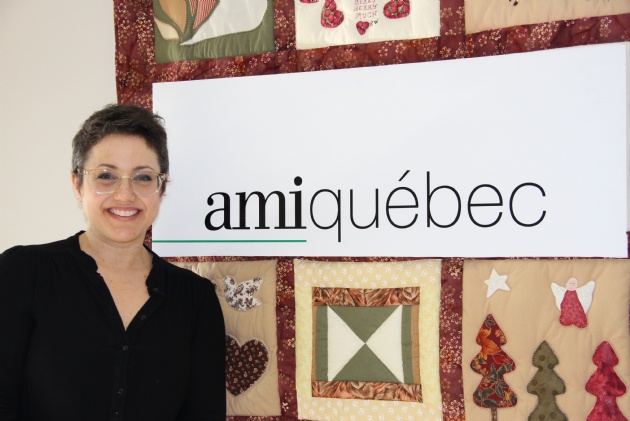Sharleen Young is a business owner and caregiver to her brother who suffers from mental illness. She is an active volunteer at AMI-Quebec, Action on Mental Illness. This is her story.
Where did your road as a caregiver to someone with mental illness begin?
It began even before my brother was diagnosed when he started acting strangely. He wasn’t even in Montreal, but I always knew where he was and I was always keeping my eyes open for trouble. So when he was in his late teens-early twenties that’s when it all started for me because we were very close and I was getting worried.
Can you describe what kind of “trouble” you mean?
What were the warning signs of mental illness?Each case is different, depending on the illness. For instance, someone with depression might feel disinterested in daily life and sad. In our case it was something else. When my brother was just a teenager he would go on rampages, punch holes in the walls, he terrorized us a lot. That kind of behaviour was a sign, but honestly my mom and I just thought he was angry and a normal teenager and were hoping it would go away.
As he got older, he would be living in rooms that he rented and they were such a mess - with ashes and food everywhere, he couldn’t keep clean at all. His clothes were everywhere and he always needed my mother and I to buy him socks and underwear. He never had money and we would bring him food on a daily basis, and it would go bad, be left open on the counter. Basically he was unable to keep proper hygiene or take care of his daily business.
He also would yell and scream, he would call us yelling and screaming and call us terrible names. That hurt! And at times he was delusional, his thoughts were incoherent and made no sense.
How was he finally diagnosed?
I had taken him to the hospital to the emergency a few times before they actually kept him. They had a hard time seeing that he had mental health problems and I guess they couldn’t do anything for him even if they did see it. But I kept bringing him back until he received a diagnosis of schizophrenia. Often mental illness signs go over-looked in the ER.
When he received his diagnosis it was difficult for us to understand what mental illness was and then to accept the diagnosis. To this day it is hard to fully understand what it is, and what it does to my brother.
But my mother and I continue to be his caregivers. We can never lose hope that he can learn to live in peace. By that I mean a relatively quiet life, as independent as possible, without relapses and hospitalizations, or as little of them as possible.
How has this role as caregiver affected your life?
It took up a lot of my personal time and I never really thought about myself because my brother was ill--I always thought that that was more important than me. So I sacrificed a lot of my time and energy. I worried so much about him. There was a lot of anxiety and stress. When I should have been thinking of normal things, I was thinking about my brother. There was also a lot of grieving for my lost brother.
How did you find AMI-Quebec and how have they helped down this path?
It was a hospital worker who told us about AMI-Quebec. AMI-Quebec gave me a place to talk to others who were going through the same thing as I was. When I wasn’t sure what to do about my brother or I was afraid for him, they were there. They also provided me with resources, such as their education classes.
AMI-Quebec has helped me accept mental illness. It’s helped me understand it, it’s made me comfortable with it, it’s helped me explain it, it’s helped me with meeting others who are in the same boat as me.
I became a volunteer at AMI because it enables me to help others, whether by leading a support group or by raising money as part of the fundraising committee.
And being part of AMI-Quebec still helps you to cope to this day?
Being involved at AMI-Quebec has empowered me. I feel that I am giving back, that I am productive, and I know that I am not alone. We are all in pain and we are all scared and anxious about our family members. We just feel hopeless and helpless and we don’t know what else to do. But we have to accept that there is not much we can do when the situation gets rough, only learn how to handle it and deal with it on a day-to-day basis as much as we can. When things do get rough, it helps to have an organization like AMI to help support us.
I talk about AMI-Quebec all the time, because it’s a fantastic resource and want others to know that AMI-Quebec is there for people across the province. You are not alone!
AMI-Quebec offers free counselling and support to caregivers of the mentally ill and many other mental health educational initiatives open to all. To find out more call us at 514-486-1448 or 1 877-303-0264 or visit our website www.amiquebec.org.

 In The Latest Issue:Latest Issue:
In The Latest Issue:Latest Issue:
- A Bittersweet Farewell
- The new Laval Aquatic Co...
- The End of an Era:
Articles
Calendar
Virtual- ANNUAL TEACHER APPRECIATION CONTEST
- APPUI LAVAL
- ARTS & CULTURE
- CAMPS
- CAR GUIDE
- CCIL
- CENTENNIAL ACADEMY
- CHARITY FUNDRAISING
- CITYTV
- COSMODÔME
- COMMUNITY CONNECTIONS
- COVER STORY
- DINA DIMITRATOS
- ÉCOLE SUPÉRIEURE DE BALLET DU QUÉBEC
- EDITORIALS
- ÉDUCALOI
- EDUCATION
- EMPLOYMENT & ENTREPRENEURSHIP
- FÊTE DE LA FAMILLE
- FÊTE DU QUARTIER SAINT-BRUNO
- FAMILIES
- FESTIVAL LAVAL LAUGHS
- FÊTE DE QUARTIER VAL-DES-BRISES
- FINANCES
- GLI CUMBARE
- GROUPE RENO-EXPERT
- HEALTH & WELL-BEING
- 30 MINUTE HIT
- ANXIETY
- CHILDREN`S HEALTH & WELLNESS
- CLOSE AID
- DENTAL WELLNESS
- EXTREME EVOLUTION SPORTS CENTRE
- FONDATION CITÉ DE LA SANTÉ
- GENERAL
- HEARING HEALTH
- MESSAGES FROM THE HEALTH AGENCY OF CANADA
- MENTAL HEALTH
- SEXUALITY
- SOCIAL INTEGRATION
- SPECIAL NEEDS
- TEENS
- THE NUTRITION CORNER
- THE NUTRITION CORNER - RECIPES
- VACATION DESTINATION
- WOMEN'S FITNESS
- WOMEN'S HEALTH
- HILTON MONTREAL/LAVAL
- HOME & GARDEN
- INTERNATIONAL WOMEN'S DAY
- JAGUAR LAVAL
- LAVAL À VÉLO
- LAVAL FAMILIES TV SHOW
- LAVAL FAMILIES MAGAZINE CARES
- LAVAL URBAN IN NATURE
- LE PARCOURS DES HÉROS
- LES PETITS GOURMETS DANS MA COUR
- LEON'S FURNITURE
- LEONARDO DA VINCI CENTRE
- LFM PREMIERES
- LIFE BALANCE
- M.P. PROFILE
- MISS EDGAR'S AND MISS CRAMP'S SCHOOL
- MISSING CHILDREN'S NETWORK
- NETFOLIE
- NORTH STAR ACADEMY LAVAL
- OUTFRONT MEDIA
- PASSION SOCCER
- PARC DE LA RIVIÈRE-DES-MILLE-ÎLES
- PÂTISSERIE ST-MARTIN
- PIZZERIA LÌOLÀ
- PLACE BELL
- PORTRAITS OF YOUR MNA'S
- ROCKET DE LAVAL
- SACRED HEART SCHOOL
- SCOTIA BANK
- SHERATON LAVAL HOTEL
- SOCIÉTÉ ALZHEIMER LAVAL
- STATION 55
- STL
- SUBARU DE LAVAL
- TECHNOLOGY
- TEDXLAVAL
- TODAY`S LAURENTIANS AND LANAUDIÈRE
- TODAY`S LAVAL
- WARNER MUSIC
- THIS ISSUE
- MOST RECENT
Magazine
Making Strides in Mental Health Awareness
an AMI-Quebec Story
Articles ~e 105,7 Rythme FM 4 chemins Annual Teacher Appreciation Contest Appui Laval Arts & Culture Ballet Eddy Toussaint Camps THIS ISSUE MORE...
CONTESTS Enter our contests
CONTESTS Enter our contests
CALENDAR
Events & Activities
COMMUNITY Posts Events
PUBLICATIONS Our Magazine Family Resource Directory
LFM BUSINESS NETWORK Learn more
COUPONS Click to save!
COMMUNITY Posts Events
PUBLICATIONS Our Magazine Family Resource Directory
LFM BUSINESS NETWORK Learn more
COUPONS Click to save!
SUBSCRIPTIONS
Subscribe to the magazine
Un-Subscribe
E-NEWSLETTER Subscribe to our E-newsletter Un-Subscribe
WRITE FOR US Guidelines & Submissions
POLLS Vote today!
E-NEWSLETTER Subscribe to our E-newsletter Un-Subscribe
WRITE FOR US Guidelines & Submissions
POLLS Vote today!
ADVERTISERS
How to & Media guide
Pay your LFM invoice
SUGGESTIONS Reader's Survey Suggest a Listing
LFM About Us Our Mission Giving Back Contact Us
SUGGESTIONS Reader's Survey Suggest a Listing
LFM About Us Our Mission Giving Back Contact Us
 PICK-UP LOCATIONS
Get a copy of LFM!
PICK-UP LOCATIONS
Get a copy of LFM!
TERMS & CONDITIONS Privacy | Terms
ISSN (ONLINE) 2291-1677
ISSN (PRINT) 2291-1677
Website by ZENxDESIGN



 BY:
BY: 
Tweet
Share